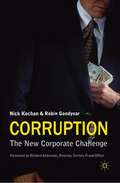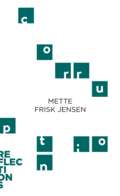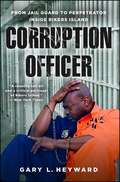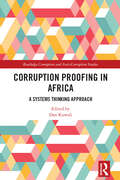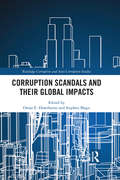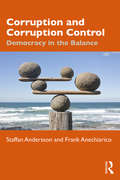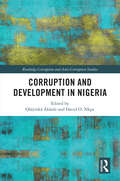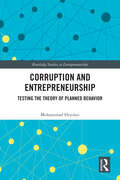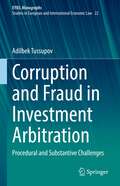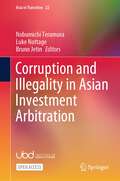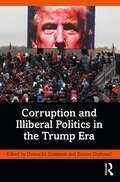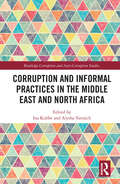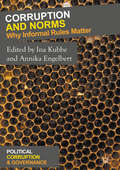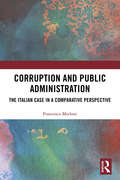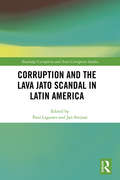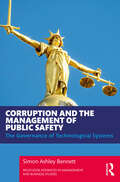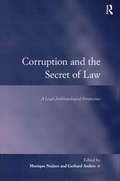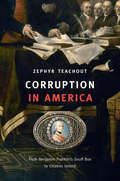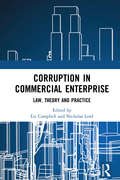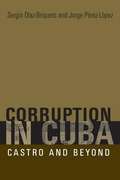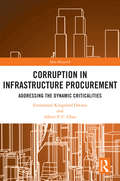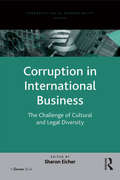- Table View
- List View
Corruption
by Nick Kochan Robin GoodyearConcerns about corruption have advanced rapidly up the list of priorities for companies throughout the world. Today, firms of every size are under particular pressure as the recently passed UK Bribery Act places some onerous obligations on their directors and employees. Now, for the first time, corporate strategy and responsibility have been analysed in the context of the new law, as well as that of previous statutes and the law of other countries. This book provides a clear and comprehensive introduction to the new legal and political landscape and examines future issues in compliance and enforcement. Corruption: The New Corporate Challenge surveys the roots of corruption, outlines worldwide efforts to combat the problem, and explores enforcement and policy choices for businesses faced with a new international environment that is ever more hostile to corruption Numerous case studies and practical compliance tips provide businesses with the knowledge needed to operate in high-risk industrial sectors and geographical regions. The authors have conducted extensive interviews with senior figures in law enforcement, academics and lawyers to explore likely developments in the law, and predict how it might be enforced. This book is essential reading not only for businesses that seek advice on tailoring compliance regimes but also for those wanting a deeper context to the global crackdown by governments and the courts on corruption. This is a subject that no corporation can avoid. The strongest response to the new challenge is for a company to re-evaluate its ethical standards and to impress those standards upon its employees and associates. Failure to do so could be very costly indeed.
Corruption (Reflections)
by Mette Frisk JensenA short but engaging look at what makes Denmark one of the least corrupt countries in the world.Corruption is a profoundly destructive force around the world, but why does its extent vary so drastically among countries? In Corruption, Mette Frisk Jensen closely links the level of corruption in a country to its wealth, the happiness of its citizens, and the level of trust citizens have in their government. Covering the shifting concept of corruption from ancient Greece to modern-day cases, Frisk Jensen discusses why corruption has historically been low in Denmark in particular. She outlines how transparency, meritocratic recruitment, bureaucratic autonomy, high standards of accountability, and impartial legal institutions have been used to combat corruption and what lessons can be learned from these policies.ReflectionsIn Reflections, a series copublished with Denmark's Aarhus University Press, scholars deliver 60-page reflections on a key concept that encapsulates their years of study and research. These books present unique insights on a wide range of topics and concepts—everything from love, trust, and play, to corruption, welfare, and sleep—that entertain and enlighten readers with exciting discoveries and new perspectives.
Corruption Officer
by Gary L. HeywardIn this shocking memoir from a former corrections officer, Gary Heyward shares an eye-opening, gritty, and devastating account of his descent into criminal life, smuggling contraband inside the infamous Rikers Island jails.Gary Heyward's life changed forever when he received a letter from the New York City Department of Corrections announcing he was accepted into the academy for new recruits. For the Harlem-born ex-Marine, being an officer of the law was the ticket he'd been waiting for to move up from a low-wage security job and out of the Polo Ground Projects in New York City--and take his mother with him. Heyward was warned of the temptations he'd encounter as a new officer, but when faced with financial hardship, he suddenly found himself unable to resist the income generated from selling contraband to inmates. In his distinctive voice, Heyward takes you on a journey inside the walls of Rikers Island, showing how he teamed up with various inmates and other officers to develop a system that allowed him to profit from selling drugs inside the jail. Corruption Officer is a jarring exposé of a man having lived on both sides of the law, a rare insider's look at a corrupt city jail, and a testament to the lengths we'll go when our backs are against the wall.
Corruption Proofing in Africa: A Systems Thinking Approach (ISSN)
by Dan KuwaliThis book outlines evidence-based and data-driven strategies for combating grand corruption in Africa.Although the causes of corruption vary from country to country, this book suggests that corruption in Africa is often a direct consequence of poorly conceived legislation, policies, and institutional loopholes. The authors in this solution-oriented book converge in arguing that effective strategies to combat corruption (corruption proofing) should integrate an independent enforcement system, vigilant civil society, vibrant media, and political leadership. Utilising empirical evidence and a systems thinking approach, the contributors also uncover root causes of corruption and identify high-leverage interventions to prevent abuse of entrusted power for personal gain. The book recommends an integrated proactive strategy that includes top-down, bottom-up, and multi-stakeholder approaches in the implementation of anti-corruption legislation and policies. Bringing together multidisciplinary and transdisciplinary research, the chapters in this volume include case studies from selected countries on the continent, including Cameroon, Kenya, Malawi, Namibia, Uganda, and Zimbabwe.Providing readers with a range of effective and functional initiatives in combating corruption in Africa, this book will be of interest to students and researchers of corruption, governance, ethics, peace and security, development, and African studies, as well as policymakers, practitioners, development partners, among other stakeholders.
Corruption Scandals and their Global Impacts (Routledge Corruption and Anti-Corruption Studies)
by Omar E. Hawthorne Stephen MaguCorruption scandals receive significant press coverage and scrutiny from practitioners of global governance, and bilateral and multilateral donors. Across the globe, the annual publication of TI’s CPI and World Bank’s Worldwide Governance Indicators elicits spirited denials and accusations of targeting, of neo-colonialism. Poor measures on corruption indices and the ensuing negative publicity can have serious consequences both externally, through a freeze or retraction of donor funding, and internally, through reducing the availability of public funds, and harming the credibility of serving governments and institutions. Corruption Scandals and their Global Impacts tracks several major corruption scandals across the world in a comparative analysis to assess the full impact of global corruption. Over the course of the book, the contributors deliberate the exposure and reporting of corruption scandals, demonstrate how corruption inhibits development on different levels and across different countries, the impact it has on the country in question, how citizens and authorities respond to corruption, and some local, regional and global policy and legislative measures to combat corruption. The chapters examine the transnational manifestation of corruption scandals around the world, from developed countries and regions such as the United States and the European Union, to BRIC countries Brazil and Russia, to developing countries such as Belarus, Jamaica, Kenya and Nigeria. In each case, chapters highlight the scandal, its impact, the local, regional and global responses, and the subsequent global perceptions of the country. Concluding with a review of the global impacts of corruption scandals, this book provides an important comparative analysis which will be useful to students and scholars of international development and politics, as well as to development practitioners, donors, politicians and policy makers.
Corruption and Corruption Control: Democracy in the Balance
by Staffan Andersson Frank AnechiaricoCorruption in politics and public administration is pervasive and difficult to eliminate. It has a strong effect on public attitudes toward government and is at the same time badly understood. A clear, comprehensive understanding of corruption is critical to the goal of ethical government that is trusted by the public. In this short and accessible text, Staffan Andersson and Frank Anechiarico demonstrate how the dynamics of life in organizations both generate corruption and make it difficult to prevent without undermining the effectiveness of government. They argue that how we define corruption, how we measure it, and how we try to combat it are strongly interrelated and should not be seen as separate issues. The authors demonstrate how this integrated approach, together with a focus on the damage caused by corruption to civic inclusivity and participation, can serve as an entry point for understanding the quality of democracy and the challenge of good governance. Using examples from mainly the United States and Sweden, Andersson and Anechiarico establish that recent anti-corruption reforms in public administration have often been narrowly focused on bribery (exchange corruption) and law enforcement approaches, while doing too little to other problems and forms of corruption, such as interest conflict. Corruption and Corruption Control: Democracy in the Balance will be of great interest to all students of politics, public administration and management, and ethics.
Corruption and Development in Nigeria (Routledge Corruption and Anti-Corruption Studies)
by Ọláyínká Àkànle and David O. NkpeDespite being Africa’s largest economy and most populous country, with abundant natural resources, Nigeria still faces substantial development challenges. This book argues that corruption lies at the heart of many of the country’s problems. Drawing on a range of different disciplinary perspectives, this volume explores the relationship between corruption and development, investigating the causes, contexts, and consequences of corruption, and the pathways for addressing it. As well as covering the wider background and theory surrounding corruption in the country, the book will investigate different sectors: the media, the judiciary, the health sector, industry, the criminal justice system, and of course politics and governance. The book concludes by considering attitudes and perceptions to corruption within Nigeria, current approaches to countering corruption, and future pathways to addressing the problem. This book’s critical investigation of the links between corruption and development in Nigeria will be of interest to researchers of corruption, development and African Studies, as well as to policy makers, practitioners, and local stakeholders.
Corruption and Entrepreneurship: Testing the Theory of Planned Behavior (Routledge Studies in Entrepreneurship)
by Mohammad HeydariThis book examines corruption as a collective behavior problem for entrepreneurs. In particular, it considers Azjen’s theory of planned behavior (TPB) to explain perceived corruption and its effects on entrepreneurship.Heydari argues that behavioral intentions are shaped by variables such as attitude, subjective norms and perceived behavioral control. He proposes the novel Heydari Behavioral Synthesis Theory (HBST) model and applies it to two case studies to highlight the institutional, individual and societal factors that may inhibit entrepreneurial behavior. He concludes that corruption may persist not just because of difficulties in monitoring and prosecuting, but because it is systemically pervasive and discourages individual countermeasures. He closes by looking at anti-corruption policies and outlining future research directions.Arguing that widespread corruption may be theoretically mischaracterized in the literature, this book is of interest to policy-makers, researchers and postgraduate students in the fields of management science, industrial and organizational psychology, entrepreneurship and corruption studies.
Corruption and Fraud in Investment Arbitration: Procedural and Substantive Challenges (European Yearbook of International Economic Law #22)
by Adilbek TussupovThis book offers an exciting overview of how the investor-state dispute settlement mechanism currently deals with allegations and/or evidence of fraud and corruption. It provides a detailed analysis of the legal framework under which arbitral tribunals usually operate in investment disputes involving allegations of illegality. Readers will find step-by-step examinations of the corruption and fraud arguments employed by arbitral tribunals in ten landmark ISDS cases, followed by a chapter summarizing the status quo on the topic. The final part of the book discusses the identified challenges of addressing illegality issues in investment arbitration and potential solutions, including the creation of a multilateral investment court.
Corruption and Government
by Susan Rose-Ackerman Rose-Ackerman, Susan and Palifka, Bonnie J. Bonnie J. PalifkaThis book suggests how high levels of corruption limit investment and growth can lead to ineffective government. Developing countries and those making a transition from socialism are particularly at risk, but corruption is a worldwide phenomenon. Corruption creates economic inefficiencies and inequities, but reforms are possible to reduce the material benefits from payoffs. Corruption is not just an economic problem, however; it is also intertwined with politics. Reform may require changes in both constitutional structures and the underlying relationship of the market and the state. Effective reform cannot occur unless both the international community and domestic political leaders support change. No single 'blueprint' is possible, but the primary goal should be to reduce the gains from paying and receiving bribes, not simply to remove 'bad apples'.
Corruption and Government: Causes, Consequences, and Reform
by Susan Rose-AckermanThis book suggests how high levels of corruption limit investment and growth can lead to ineffective government. Developing countries and those making a transition from socialism are particularly at risk, but corruption is a worldwide phenomenon. Corruption creates economic inefficiencies and inequities, but reforms are possible to reduce the material benefits from payoffs. Corruption is not just an economic problem, however; it is also intertwined with politics. Reform may require changes in both constitutional structures and the underlying relationship of the market and the state. Effective reform cannot occur unless both the international community and domestic political leaders support change. No single 'blueprint' is possible, but the primary goal should be to reduce the gains from paying and receiving bribes, not simply to remove 'bad apples'.
Corruption and Illegality in Asian Investment Arbitration (Asia in Transition #22)
by Luke Nottage Bruno Jetin Nobumichi TeramuraThis open access book explores Asian approaches towards investment arbitration—a transnational procedure to resolve disputes between a foreign investor and a host state—setting it in the wider political economy and within domestic law contexts. It considers the extent to which significant states in Asia are, or could become, “rule makers” rather than “rule takers” regarding corruption and serious illegality in investor-state arbitration. Corruption and illegality in international investment are widely condemned in any society, but there remains a lack of consensus on the consequences, especially in investment arbitration. A core issue addressed is whether a foreign investor violating a host state’s law should be awarded protection of its investment, as per its contract with the host state and/or the applicable investment or trade agreement between the home state and the host state. Some suggest such protection would be unnecessary as the investor committed a crime in the host state, while others attempt to establish an equilibrium between the investor and the host state. Others claim to protect investment, invoking the sanctity of promises made. The book starts with a deep dive into economic and legal issues in corruption and investment arbitration and then explores the situation and issues in major countries in the region in detail. It is a useful reference point for lawyers, economists, investors, and government officials who are seeking comprehensive and up-to-date information on anti-bribery rules in Asian investment treaties. It is of particular interest to students and researchers in economics, finance, and law, who are undertaking new research relating to the multifaceted impacts of corruption.
Corruption and Illiberal Politics in the Trump Era
by Donna M. Goldstein Kristen DrybreadThis book explores the nexus of corruption, late capitalism, and illiberal politics in the Trump era. Through deep, contextualized analysis and careful critique, it offers valuable perspectives on how corruption is defined and understood in the current historical moment. The book asks: Is today's corruption something new, or is it a continuation of prior patterns of illiberalism? Chapters in this collection consider how corruption is practiced, mobilized, or invoked in a range of cases, each of which is embedded within larger concerns about what citizenship, social belonging, honesty, and justice mean in the United States today. The authors examine a constellation of unscrupulous actors and questionable actions, with topics ranging from sex scandals and shady real estate deals to the Trump administration’s response to the COVID-19 pandemic. Several essays directly address the increasingly violent rhetoric and the deliberately anti-democratic policies that have flourished during the Trump era. The book draws on anthropological insights and comparative analysis to place the policies and practices of Trump and his supporters in a wider global context. Corruption and Illiberal Politics in the Trump Era will be of great interest to readers from anthropology, sociology, political science, discourse studies, media studies, linguistics, and American studies.
Corruption and Informal Practices in the Middle East and North Africa (Routledge Corruption and Anti-Corruption Studies)
by Ina Kubbe Aiysha VarraichThis book investigates the pervasive problem of corruption across the Middle East and North Africa. Drawing on the specifics of the local context, the book explores how corruption in the region is actuated through informal practices that coexist and work in parallel to formal institutions. When informal practices become vehicles for corruption, they can have negative ripple effects across many aspects of society, but on the other hand, informal practices could also have the potential to be leveraged to reinforce formal institutions to help fight corruption. Drawing on a range of cases including Morocco, Lebanon, Turkey, Jordan, Tunisia or Israel the book first explores the mechanisms and dynamics of corruption and informal practices in the region, before looking at the successes and failures of anti-corruption initiatives. The final section focuses on gender perspectives on corruption, which are often overlooked in corruption literature, and the role of women in the Middle East. With insights drawn from a range of disciplines, this book will be of interest to researchers and students across political science, philosophy, socio-legal studies, public administration, and Middle Eastern studies, as well as to policy makers and practitioners working in the region.
Corruption and Norms: Why Informal Rules Matter (Political Corruption and Governance)
by Ina Kubbe Annika EngelbertThis book focuses on the role of norms in the description, explanation, prediction and combat of corruption. It conceives corruption as a ubiquitous problem, constructed by specific traditions, values, norms and institutions. The chapters concentrate on the relationship between corruption and social as well as legal norms, providing comparative perspectives from different academic disciplines, theoretical and methodological backgrounds, and various country-studies. Due to the nature of social norms that are embedded in personal, local, and organizational contexts, the contributions in the volume focus in particular on the individual and institutional level of analysis (micro and meso-mechanisms). The book will be of interest to students and scholars across the fields of political science, public administration, socio-legal studies and psychology.
Corruption and Public Administration: The Italian Case in a Comparative Perspective
by Francesco MerloniCorruption and Public Administration looks at public sector organizations and what they have achieved since signing the UN Convention Against Corruption (UNCAC) Agreement in Merida in 2004. It examines how the signee countries engaged in the set-up of institutions to contain corruption in public administration, and how these governments and institutions have progressed. The book compares several developed countries, and undertakes an especially detailed examination of Italy. It highlights strengths and weaknesses, and proposes organizational means of addressing the issues, which include diversity in organizational structures and systems, and a focus on prevention rather than repression. The book shines a light on anti-corruption practices and aims to foster open discussion about this pressing topical issue among peers in all relevant fields of the social sciences.
Corruption and Reform in India: Public Services in the Digital Age
by Jennifer BussellThis book asks why some governments improve public services more effectively than others. Through the investigation of a new era of administrative reform, in which digital technologies may be used to facilitate citizens' access to the state, Jennifer Bussell's analysis provides unanticipated insights into this fundamental question. In contrast to factors such as economic development or electoral competition, this study highlights the importance of access to rents, which can dramatically shape the opportunities and threats of reform to political elites. Drawing on a sub-national analysis of twenty Indian states, a field experiment, statistical modeling, case studies, interviews of citizens, bureaucrats and politicians, and comparative data from South Africa and Brazil, Bussell shows that the extent to which politicians rely on income from petty and grand corruption is closely linked to variation in the timing, management and comprehensiveness of reforms.
Corruption and the Lava Jato Scandal in Latin America (Routledge Corruption and Anti-Corruption Studies)
by Jan Svejnar Paul F. LagunesCorruption and the Lava Jato Scandal in Latin America brings together key international and interdisciplinary perspectives to shine new light on Lava Jato, or Operation Car Wash, Latin America’s largest corruption scandal to date. Since 2014, this scandal has unfolded in surprising ways to expose collusion between construction companies and state officials in Brazil and 11 other countries. The corruption uncovered amounts in the order of hundreds of millions of dollars in bribes and billions of dollars in stolen state funds. The volume features evidence that the main construction company at the center of the scandal was—apparently—deliberate about seeking business in corrupt markets. It also evaluates the ambiguous role played by the media, whose members often relied uncritically on classified information released by the authorities. The volume further contributes to our understanding with studies on a number of other relevant topics, including: the overlap between corruption and the planning of the Rio Olympics; Mexico and Peru’s contrasting responses to Lava Jato; the policy reforms needed to avoid a similar scandal in the future; and the roadmap for how Lava Jato should end. Across 15 chapters by leading and emerging scholars and practitioners, this book engages with these issues from a balanced and unbiased perspective, including interviews with key stakeholders on both sides of the case. As one of the first book-length studies to deal with Lava Jato in the English language, this ground-breaking volume is a compelling reading for advanced students and researchers in areas including Corruption Studies, Public Ethics, Political Science, and Latin American Studies, as well as for practitioners working to make governments more accountable.
Corruption and the Management of Public Safety: The Governance of Technological Systems (ISSN)
by Simon Ashley BennettGraft is a common and persistent social pathogen that afflicts the developed and developing world in equal measure. This book describes, through the medium of international case studies, how graft undermines public safety and how, following a near-miss, incident or accident, investigators can use actor-network theory (ANT) to ascertain to what degree and through what mechanisms graft contributed to the event.The book introduces the reader to graft through a variety of case studies and explains how graft works against the public interest. The relatable case studies include the 1989 Hillsborough football stadium disaster, 2007 Adam Air crash, 2015-ongoing Volkswagen diesel emissions scandal and 2020 Beirut ammonium nitrate explosion (Lebanon). It demonstrates the threat graft poses to public safety, economic success and corporate and national reputation. By the end of the book the reader will understand the nature and extent of the problem of graft, how graft undermines safety, confidence and reputation, and how ANT can be used to identify and quantify graft in respect of the governance of technological systems and to ascertain to what degree and through what mechanisms graft contributed to a near-miss, incident or accident.Primarily aimed at an academic audience, this book will offer essential insights to students, researchers and faculty within the fields of risk, crisis and disaster management, as well as corporate governance and safety. The accessible nature of the book will also appeal to safety practitioners, risk managers and accident investigators.
Corruption and the Secret of Law: A Legal Anthropological Perspective (Law, Justice and Power)
by Gerhard AndersThis volume presents an anthropological perspective on the hidden continuities between corruption and law. The authors argue that the two opposites, corruption and law, are inextricably linked - with the possibility of the former already inscribed into the latter. Taking a critical stance towards the normative good governance agenda spearheaded by institutions such as Transparency International and the World Bank, this volume argues that by uncritically depicting corruption as an absolute evil, these anti-corruption programs disregard the close relationship that exists between corruption and state power. Addressing various aspects of a complex and ambivalent phenomenon, Corruption and the Secret of Law draws on studies from different parts of the world including Burundi, China, Indonesia, Italy, Japan, Mexico and the USA and provides a valuable resource for students, researchers and policy-makers working in this area.
Corruption in America: From Benjamin Franklin's Snuff Box to Citizens United
by Zephyr TeachoutWhen Louis XVI presented Benjamin Franklin with a snuff box encrusted with diamonds and inset with the King's portrait, the gift troubled Americans: it threatened to "corrupt" Franklin by clouding his judgment or altering his attitude toward the French in subtle psychological ways. This broad understanding of political corruption-rooted in ideals of civic virtue-was a driving force at the Constitutional Convention. For two centuries the framers' ideas about corruption flourished in the courts, even in the absence of clear rules governing voters, civil officers, and elected officials. Should a law that was passed by a state legislature be overturned because half of its members were bribed? What kinds of lobbying activity were corrupt, and what kinds were legal? When does an implicit promise count as bribery? In the 1970s the U. S. Supreme Court began to narrow the definition of corruption, and the meaning has since changed dramatically. No case makes that clearer than Citizens United. In 2010, one of the most consequential Court decisions in American political history gave wealthy corporations the right to spend unlimited money to influence elections. Justice Anthony Kennedy's majority opinion treated corruption as nothing more than explicit bribery, a narrow conception later echoed by Chief Justice Roberts in deciding McCutcheon v. FEC in 2014. With unlimited spending transforming American politics for the worse, warns Zephyr Teachout, Citizens United and McCutcheon were not just bad law but bad history. If the American experiment in self-government is to have a future, then we must revive the traditional meaning of corruption and embrace an old ideal.
Corruption in Commercial Enterprise: Law, Theory and Practice
by Nicholas Lord Liz CampbellThis edited collection analyses, from multiple disciplinary perspectives, the issue of corruption in commercial enterprise across different sectors and jurisdictions. Corruption is commonly recognised as a major ‘social bad’, and is seriously harmful to society, in terms of the functioning and legitimacy of political-economic systems, and the day-to-day lives of individuals. There is nothing novel about bribes in brown envelopes and dubious backroom deals, ostensibly to grease the wheels of business. Corrupt practices like these go to the very heart of illicit transacting in both legal markets – such as kickbacks to facilitate contracts in international commerce – and illegal markets – such as payoffs to public officials to turn a blind eye to cross-border smuggling. Aside from the apparent pervasiveness and longevity of corruption in commercial enterprise, there is now renewed policy and operational attention on the phenomenon, prompting and meriting deeper analysis. Corruption in commercial enterprise, encompassing behaviours often associated with corporate and white-collar crime, and corruption in criminal commercial enterprise, where we see corruption central to organised crime activities, are major public policy issues. This collection gives us insight into their nature, organisation and governance, and how to respond most appropriately and effectively.
Corruption in Cuba: Castro and Beyond
by Sergio Díaz-Briquets Pérez-López JorgeEven though combating corruption cannot be the central aim of post-Castro policy, Sergio Díaz-Briquets and Jorge Pérez-López suggest that, without a strong plan to thwart it, corruption will undermine the new economy, erode support for the new government, and encourage organized crime. In short, unless measures are taken to stem corruption, the new Cuba could be as messy as the old Cuba.
Corruption in Infrastructure Procurement: Addressing the Dynamic Criticalities (Spon Research)
by Albert P.C. Chan Emmanuel Kingsford OwusuThis book presents an extensive study on the extant constructs of corruption in infrastructure-related projects and aims to contribute to the determination and elimination of its incidence and prevalence in infrastructure projects. The book conducts a comprehensive examination of the various determining factors of corruption that negatively affect the procurement process and, in the end, result in cost and time overruns. The authors present an in-depth understanding of how the identified determining factors of corruption can be addressed. Thus, it is intended to broaden the reader's knowledge of the causes, risk indicators, and different forms of corrupt practices in the procurement process of infrastructure works, before explaining how they affect its stages and activities A dynamic model is developed to demonstrate how to tackle the overall impact of corruption within the procurement process and, at the same time, increase the effectiveness of the extant anti-corruption measures. In short, this book demonstrates that the fight against corruption in the procurement process is strategically feasible and must continue. This book is essential reading for academics, researchers, professionals and stakeholders in the procurement of infrastructure projects and civil works, as well as those with an interest in corruption, construction management and construction project management.
Corruption in International Business: The Challenge of Cultural and Legal Diversity (Corporate Social Responsibility)
by Sharon EicherIt is common practice to assume that business practices are universally similar. Business and social attitudes to corruption, however, vary according to the wide variety of cultural norms across the countries of the world. International business involves complex, ethically challenging, and sometimes threatening, dilemmas that can involve political and personal agendas. Corruption in International Business presents a broad range of perspectives on how corruption can be defined; the responsibilities of those working for publicly traded companies to their shareholders; and the positive influences that corporations can have upon combating international corruption. The authors differentiate between public and private sector corruption and explore the implications of both, as well as methods for qualifying and quantifying corruption and the challenges facing policy makers, legal systems, corporations, and NGOs, as they seek to mitigate the effects of corruption and enable cultural and social change.
